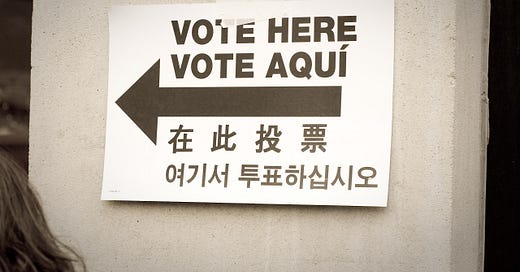New York’s city council elections are really uncompetitive this year
Almost two-thirds of New York’s council members are on-track to win by default. That bodes poorly for our city and for trust in democracy.
At the end of June, New Yorkers will have the opportunity to vote in city council primary elections. These elections determine which candidates from the Democratic and Republican parties will proceed to the general city council election in November.
To recap, New York’s 51 city council members are our legislators. They write the laws and determine the budget for everything the city does: streets, schools, police, land use, zoning, parks, garbage collection, water and sewage, and much more. That’s a lot of topics that impact New Yorkers’ lives. The city is divided into 51 council districts, each with a population of around 165,000 residents. You can learn who your council member is here.
Despite having all this power and every city council seat being up for election this year, I expect very few New Yorkers are even aware these elections are taking place. I’ve seen zero campaign signage around the areas of the city I visit.
The race has begun, but very few candidates are running
That’s because this year’s council elections are incredibly uncompetitive:
In 22% of city council districts the incumbent is running for re-election without any opposition (either from within their own party or from the opposing party)
In 63% of city council districts the incumbent is running for re-election without facing any primary challengers
Throughout most of the city the Democratic Party dominates, and the winner of the Democratic Party primary effectively wins the general election by default. The lack of primary challengers means that 63% of New Yorkers have no meaningful choice about who represents them on the city council.
I live in council district 4, which covers much of Manhattan’s East Side. The incumbent council member, Keith Powers, is up for re-election. No one is challenging him in the Democratic Party primary, so he’ll proceed to November’s general election automatically. There is one Republican Party candidate, who also will proceed straight to the general election without a primary. In the 2021 general election Keith Powers won 74% of the vote against that year’s Republican candidate, so he is all but guaranteed to win again this year. I have no particularly strong feelings about the performance of incumbent council member Powers, but I do think it would be healthy for residents of district 4 to have a genuine choice. This configuration is repeated across the city; only 37% of the city’s 51 council districts have competitive elections this year.
Why are this year’s elections so uncompetitive?
Some of this is just a question of term limits and the power of incumbency. New York’s 2021 council elections were very competitive. In 2021, 28 of the city’s 51 incumbent council members were prohibited by term-limits from seeking re-election. Three other council members chose to retire before the election. This resulted in 31 districts with wide-open races, and a frenzy of candidates put themselves forward. In contrast, in this year’s election only two districts have no incumbent running for re-election. Perhaps potential candidates see incumbent council members as too hard to beat, or challengers feel burned-out from races in 2021.
Another factor is that this year’s election is unusually soon after the previous election. Council terms are normally four years long, but the current term is just two years because of a quirk related to redistricting following the 2020 census.
I have a hunch that the trade-off between compensation and effort plays a factor, too. Challenging an incumbent council member for their seat is a time-consuming, expensive, and difficult task. Then, once you get elected, being an effective council member is a job that takes a lot of effort. Council members are often expected to attend events in the evening and on weekends. People loudly (and sometimes viciously) critique everything they do. In exchange, city council members are paid annual salaries of $148,500 and given the chance to write the laws of our city. In future articles I want to dig more into the topic of compensation for elected officials, but I’ll leave this as a provocation: How many of those council districts would be be more competitive if the salary for a council member was $300,000? $500,000? $1 million?
Ultimately, citizens having genuine choices between candidates is important. That’s how New Yorkers are supposed to express their opinions on crucial topics like funding and policies for housing, police, education, public space, and so much more. Competitive elections push officials to work hard on behalf of their constituents and maintain voters’ trust in the democratic system. For most of the city, the lack of competition in this year’s council elections leaves New Yorker’s with no meaningful voice and will lead residents to tune out of local politics.
Sebastian




I’m not 100% sure, but I feel like the public advocate is supposed to be speaking up about issues like this, but not sure that is happening 🥲
This is a really great write up - and I couldn’t agree more that these elections should be more competitive! Do you think that paying city council members more will cause more of a financial motive for people to run instead of genuine interest to serve?